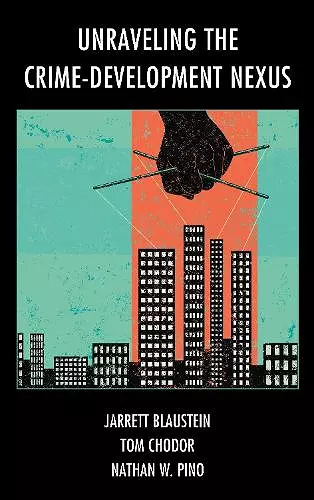Unraveling the Crime-Development Nexus
Nathan W Pino author Jarrett Blaustein author Tom Chodor author
Format:Paperback
Publisher:Bloomsbury Publishing PLC
Published:22nd Mar '24
Currently unavailable, and unfortunately no date known when it will be back

Unraveling the Crime-Development Nexus interrogates the claim that crime represents a significant threat to economic development. Combining historical analysis with a unique empirical perspective based on interviews with high-level international crime policy insiders, it accounts for how and why the ‘crime-development nexus’ has been invoked by international actors, including the United Nations, to advance and secure variations of a global capitalist development agenda since the 19th Century.
Drawing on perspectives anchored in critical criminology, International Relations, and development studies, Unraveling the Crime Development Nexus reveals that the international crime policy agenda today remains overwhelmingly responsive to those who benefit from the further expansion of neoliberal globalisation, while simultaneously marginalising subordinate actors throughout the ‘developing’ world.
The book concludes by considering how international organisations, civil society actors, and major donors might support a more equitable and sustainable model of global crime governance that addresses the structural causes of crime and uneven development at a global level.
The authors of this book attempt to discover how crime and efforts to control crime contribute to social development, specifically in the United Nations. Using history and criminological theory, the authors start by explaining why crime is a development issue. Then they dive into a larger discussion of theory and global crime governance before examining the history behind the crime-development nexus. The remainder of the text deals with issues surrounding crime, especially international crime, and global capitalism... The authors' use of history and theory throughout gives the discussion a complex and layered approach, and their rich exploration of this topic sheds light on an important global issue. Recommended. Graduate students, researchers, and faculty. * Choice Reviews *
Blaustein, Pino, and Chodor's Unravelling the Crime-Development Nexus draws our attention to a huge, and hugely important area of global crime control that has been largely neglected by criminologists. The authors trace the emergence of a very particular way of framing, managing, and engaging with a vision of crime at the global level and the key role in that played by the United Nations Office on Drugs and Crime (UNODC). This is a path breaking work that contributes both a critical criminology and political economy of crime in the global present. -- Mark Brown, Senior Lecturer in Law, University of Sheffield (author of Penal Power and Colonial Rule)
Finally, we have a critical appraisal of the nexus between ‘crime’ and ‘development’ that properly grounds the social constructivist analyses pertaining to the discourses of ‘transnational organized crime’ in the material and institutional context of global policing and (in)security in which such language arises. This analysis reveals that the overriding logic of global governance networks that aim to construct a consensus about how transnational crime should be governed is to facilitate and manage the spread of global capitalism which, inevitably, marginalizes any challenges to the power dynamics that underpin the actual criminogenic attributes of world system governance. This book is a must read for anyone interested in understanding global policing. -- James Sheptycki, Professor of Criminology, York University (co-author of Global Policing)
Critical criminology meets development studies in this masterful interrogation of the “crime-development nexus.” In the first book of its kind, the authors carefully trace how a particular understanding of this nexus was constructed in international policy circles in recent decades, and show why it has become a central dimension of global crime governance. Unraveling the Crime-Development Nexus makes a timely and important contribution to the study of transnational crime and crime control. -- Peter Andreas, John Hay Professor of International Studies, Brown University (co-author of Policing the Globe: Criminalization and Crime Control in International Relations)
Startlingly original. Unraveling the Crime Development Nexus is the rare study that breaks the nation state’s grip on the study of crime and criminology to offer an empirically grounded, and critical examination of global crime governance. -- Jonathan Simon, Lance Robbins Professor of Criminal Justice Law, University of California at Berkeley (author of Governing through Crime)
Unravelling the Crime Development Nexus will be first place to go for people who want to understand the UN’s work on crime and drugs. I wish there were as equally sophisticated and up-to-date studies of the UN’s work combatting all of the other dozen or so major global problems it addresses, from war to climate change. Unfortunately, there aren’t, but perhaps this book will inspire them. -- Craig Murphy, Betty Freyhof Johnson ’44 Professor of Political Science, Wellesley College and former official historian of the United Nations Development Programme
If the United Nations Sustainable Development Goals are most commonly associated with economics and the environment, why is fighting crime now regarded as an essential part of the package? In Unraveling the Crime-Development Nexus, Blaustein, Chodor and Pino take a deeply historical and theoretically rich approach to unearthing how crime and development became discursively inter-twined, and the implications for power and exclusion in 21st century global governance. In crossing disciplinary boundaries they provide a sophisticated yet accessible account of both tectonic long-term changes in international politics as well as current international policy making. -- Jason Sharman, Sir Patrick Sheehy Professor of International Relations, University of Cambridge (author of The Money Laundry: Regulating Criminal Finance in the Global Economy)
Overall, this is an empirically rich book that tells a complex story with many moving parts, from the global political economy to individuals. It contributes to broader debates on the construction of ‘problems’ in global governance, the role of international organizations in the (re) production of hegemonic orders and the continuities between the colonial past and the postcolonial present. * International Affairs *
ISBN: 9781786611017
Dimensions: 227mm x 150mm x 21mm
Weight: 422g
274 pages